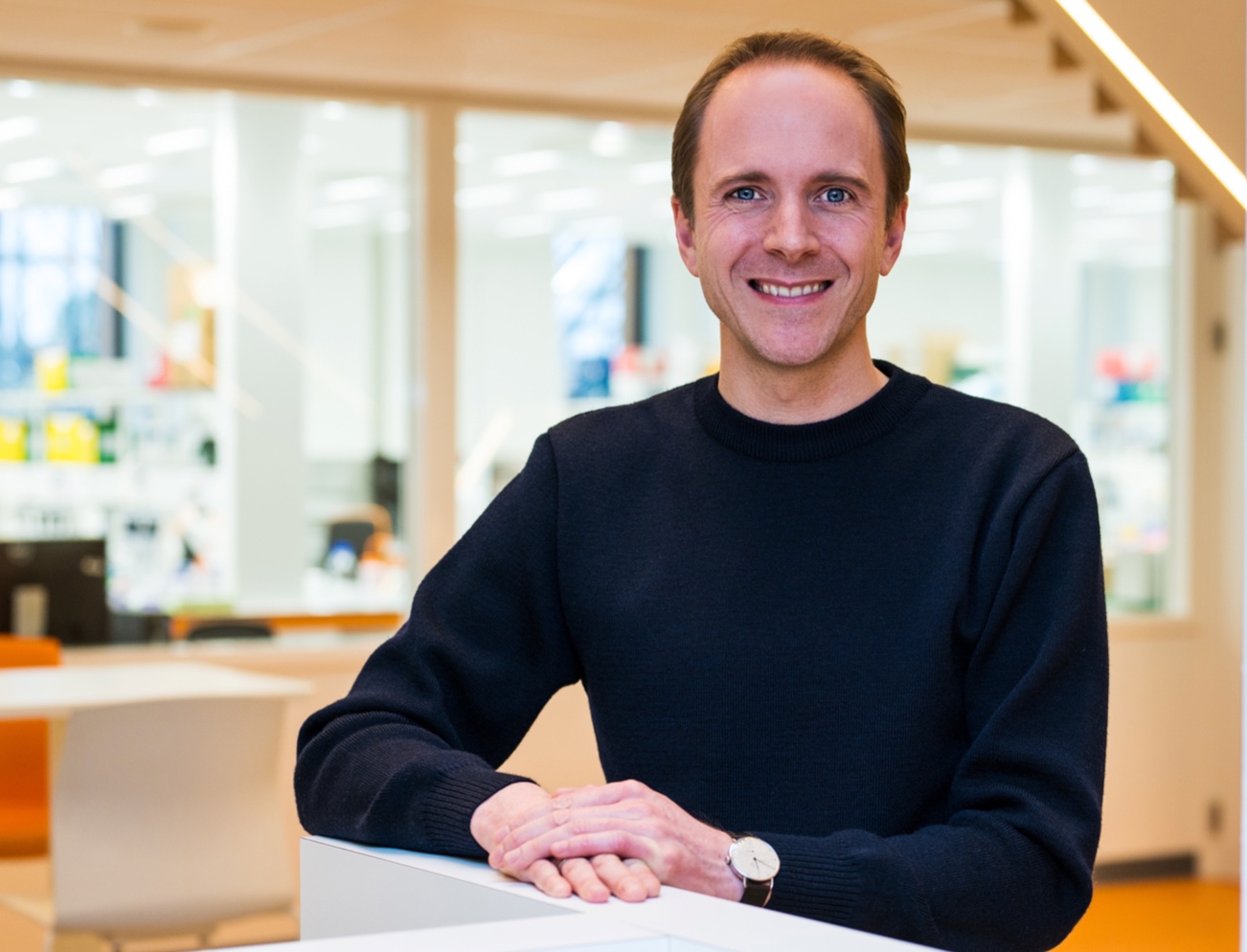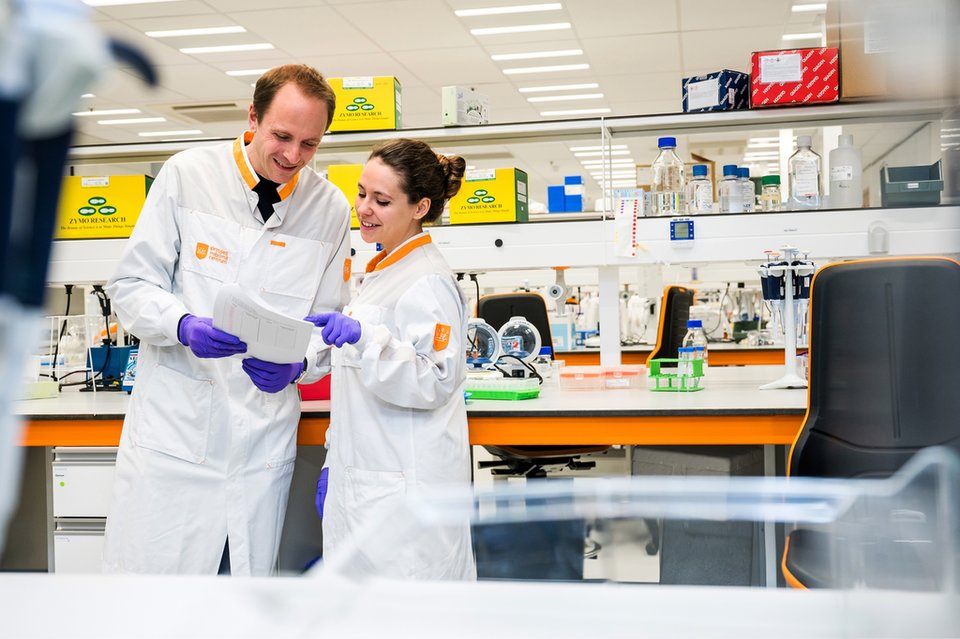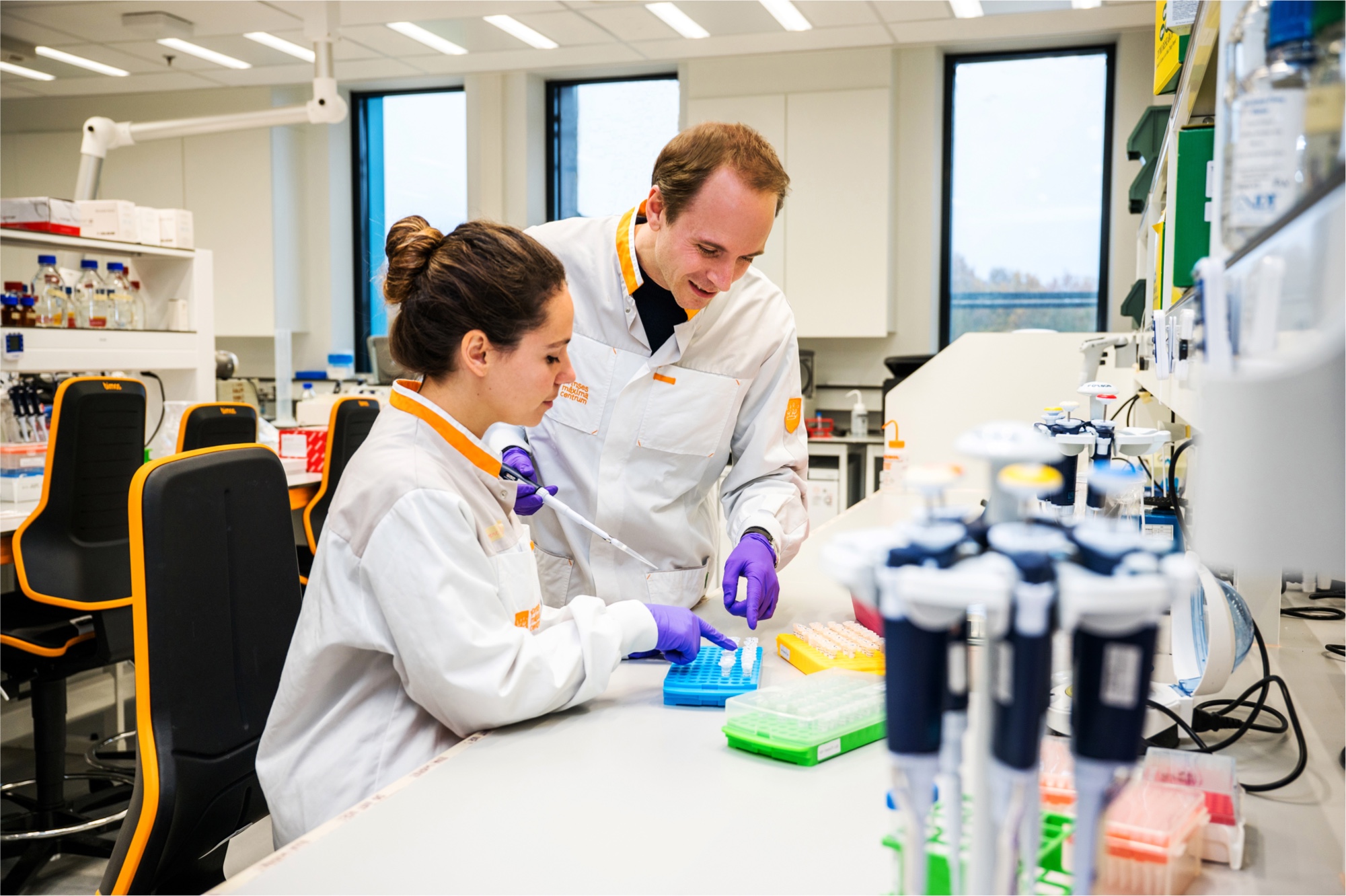Behind The Mission
02

The impact of Oncode Accelerator
Sebastiaan van Heesch is research group leader at the Princess Máxima Center for pediatric oncology in Utrecht and junior investigator at Oncode Institute. After completing his PhD at the Hubrecht Institute under the guidance of human geneticist and now Hartwig Medical Foundation Director Edwin Cuppen, and a postdoctoral position at the Max-Delbrück-Center in Berlin, he moved back to Utrecht in 2020 to start his research group.
“I started working at the Máxima Center shortly after becoming a parent myself. Walking around our research hospital, I quickly realized that your child having to face cancer is one of the worst things that can happen to a family. That is a huge driving force for me to do everything possible to improve cancer treatment by discovering new therapies.” Sebastiaan’s commitment to advancing cancer treatment extends beyond his role as group leader at the Máxima Center: he joined Oncode Institute per 2024 and acts as vice chair and management team member of the Therapeutic Vaccines workstream within Oncode Accelerator. In this blog, Van Heesch talks about his enthusiasm for research and his perspective on the impact of Oncode Accelerator.
“My fascination for fundamental science has been a constant. Over time, it has become increasingly important for me to also work on translating that fundamental knowledge into impact for patients. Since my time at the Hubrecht Institute, I have always been involved in patient-oriented projects. Though my focus at the Máxima Center remains on fundamental and pre-clinical research, there’s always an eye for direct translation into clinical practice. A good example is with my previous research group in Berlin – where I worked as a postdoc – where I was at the forefront of the discovery of microproteins in human tissues. This opened a whole new world for research and possible future commercial applications.
My fascination for fundamental science has been a constant. Over time, it has become increasingly important for me to also work on translating that fundamental knowledge into impact for patients.
By Sebastiaan van Heesch
By now, several companies have emerged based on these discoveries and those of colleagues round the world. They explore the role of microproteins in cancer and other diseases, their mechanisms of action, and therapeutic possibilities. I still find it exciting that even though my work is on a very fundamental level, the step towards translation is often smaller than you think. This directly feeds into my role at Oncode Accelerator, where we aim to speed up the preclinical development route from a therapeutic candidate to a product that truly benefits patients. It is a simple mantra: how can we valorize our findings as fast as possible? Valorization is also one of the core elements of Oncode Institute. I am confident that the two organizations will reinforce each other in this regard.

Within the vaccines workstream, our focus is on determining the most suitable indicators of tumor specificity for vaccine development. In other words: are there potential targets visible on the outside of a tumor cell that we can use to target with vaccines, to train the immune system to respond and eliminate the cancer? These targets are not always encoded in the DNA of the tumor cell. We specialize in identifying tumor-specific antigens that may not be hardcoded in our DNA, but instead emerge during gene transcription and translation into protein. These are not easy to discover, and my research group spent the last few years optimizing our methods to better visualize whether such changes are present and targetable. Once you know exactly which tumor-specific changes are present, you can prioritize them through data analyses and develop vaccines against the most promising targets. Within our workstream, we specifically see the potential of identifying patterns of changes shared by multiple patients, since these allow the creation of an off-the-shelf vaccine that could help many patients. This would increase the accessibility and cost-efficiency of these vaccines as compared to personalized strategies.
We specialize in identifying tumor-specific antigens that may not be hardcoded in our DNA, but instead emerge during gene transcription and translation into protein.
By Sebastiaan van Heesch
The strength of Oncode Accelerator lies in bringing together expert academic labs and companies in a single collaborative consortium: each partner contributes to a different stage of vaccine development, from target discovery to vaccine production and everything in between. While my role is primarily at the beginning of the therapeutic vaccines pipeline – colleague Sjoerd van den Burg being the overall lead – I also interact a lot with partners whose focus is more towards the end of that pipeline, from which I learn a lot. That, in my opinion, is truly unique: the National Growth Fund has been able to bring together varying expertise in vaccine development to enable tangible improvements for patients in a nationwide manner. Despite being a small country, our current organization enables us to make a significant impact and position cancer vaccine development in the Netherlands at the forefront worldwide.

Most of the innovations we are implementing in our workstream involve collaborations with the other Oncode Accelerator technology platforms: Artificial Intelligence, patient cohorts, and organoids. For instance, the use of tumoroids – 3D mini tumors grown in the lab – allows for more effective analyses with only small amounts of tumor tissue. AI can support in the selection of the best targets for vaccine development in an early stage. Patient cohorts give us access to materials and clinical information that helps us better target vaccine development. These innovations are crucial for derisking and helping us eliminate strategies early on that could be unsuccessful: we want to invest as little time, money, and energy as possible in targets that prove to be unsuitable later in the process.
I’d like to conclude by saying that I’m excited about what lies ahead. Oncode Accelerator brings together a lot of smart, talented, and experienced people in the Netherlands with a common purpose: helping people with cancer. We’re working together to accelerate the development of innovative therapies to address unmet medical needs, and we will only be successful in that if we leverage our combined expertise, knowledge, and methods. If our joint efforts lead to the development of a unique and effective cancer therapy that improves patients’ lives, that, to me, is a great outcome. In the end it's not about who does it, but about making sure that it happens. Our collaborative effort ensures just that."
About
Sebastiaan van Heesch
Sebastiaan is Research group leader at the Princess Máxima Center for pediatric oncology in Utrecht and junior investigator at Oncode Institute. He acts as vice chair and management team member of the Therapeutic Vaccines workstream within Oncode Accelerator.
Credits: photography by Marloes Verweij, Laloes Fotografie